"The saying 'It's not over 'til the fat lady sings' is erroneous, because women who are fat are never listened to." -Margaret Cho
Last year, the OPERA collaboration made worldwide headlines when they announced the results of a remarkable experiment.
From over 730 kilometers away, in another country, neutrinos were created by one of the most powerful particle accelerators in the world. Protons at over 99.999% the speed of light were smashed into matter, creating a highly collimated beam of neutrinos, which was launched through the Earth at, presumably, speeds indistinguishable from the speed of light.
Underground, beneath the Italian mountain of Gran Sasso, laid the huge OPERA detector, capable of detecting these high-energy neutrinos.
But what it was also able to do, so they claimed, was to measure the timing of these neutrinos so accurately as to be able to test Einstein's theory of special relativity!
As you well-know, nothing is supposed to be able to move faster than the speed of light in a vacuum. Nothing. Which is why it was absolutely shocking when they released their first results.
60 nanoseconds early, they said, their neutrinos arrived. This wasn't an error, either, they said, as their uncertainties were only around 10 nanoseconds. And if that was true, over the distances they were talking about, that means these neutrinos would be moving something like 7,500 m/s faster than light, which is huge!
As we've said many times, claims like these, that are extraordinary, require evidence that is also extraordinary. So I was very excited to report that, in short order, we were going to either confirm or refute OPERA's claims!

Because two experiments -- T2K in Japan, above, and MINOS in the USA, below -- were all set up to measure the same exact thing to even better precision.
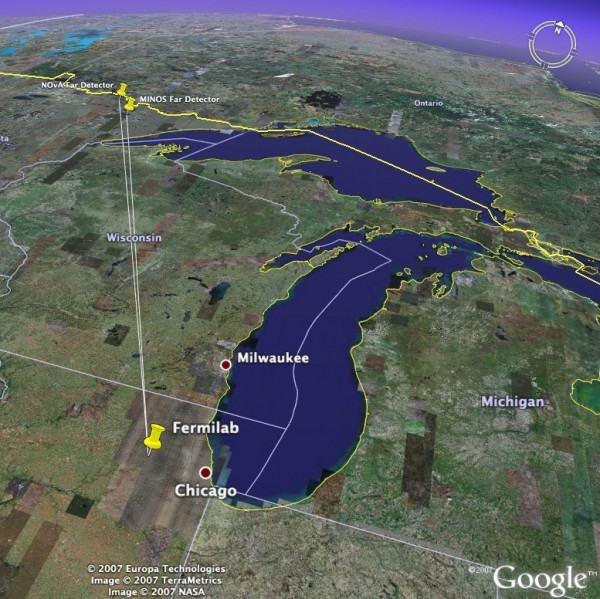
But another experiment, one that had come out earlier and challenged OPERA's results, had other plans. You see, OPERA had recently announced that they had uncovered two potential problems with their experiment -- the loose cable and a possible timing miscalibration -- which threw their results into doubt.
What it really meant, if you look up at the image of their claimed results, is that their claimed errors, which were tiny, should have actually been much larger due to those issues.
This is a problem that plagues a great many experimental and observational sciences: fully accounting for your systematic errors. After all, it is difficult to account for uncertainties and / or errors due to something you were simply expecting would work properly! You account for systematics based on all the errors you can reasonably anticipate, but once those are over and done with, you stop counting. But when an unexpected error does happen, and you weren't expecting it, it can lead you to have an undue amount of false confidence in what are actually insignificant results.
And it was the ICARUS team -- another neutrino detector underneath Gran Sasso -- that set out to show that OPERA had done exactly that. Intending to refute the OPERA team's results, ICARUS has gone out to set the record straight about Einstein's relativity.
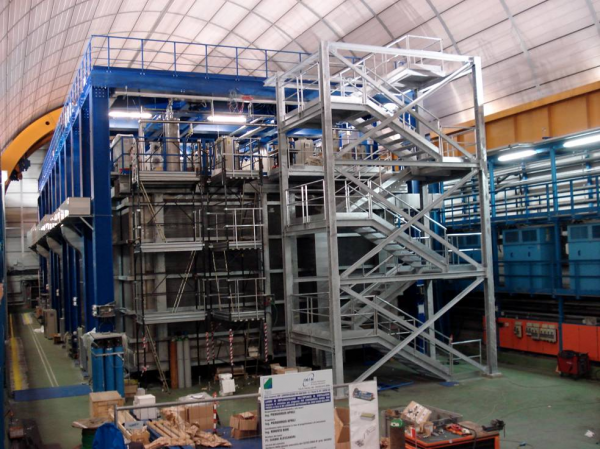
Image credit: the ICARUS-T600 detector installed in LNGS - HallB, retrieved from neutel11.wordpress.com.
Evoking shades of Ethel Merman, ICARUS basically said to OPERA, "Anything you can do, I can do better." And, over practically the same baseline, using the same energy neutrinos created from the same proton beam, ICARUS set out to re-test the OPERA experiment.
Except, you know, without the errors. And what they found should put the whole issue to rest. The OPERA neutrinos, you'll remember, arrived around 60 nanoseconds early, with an originally claimed uncertainty of 10 ns. The ICARUS results, making the same measurements with different equipment?
As others have noted, this time, there can be no doubt that ICARUS has directly refuted OPERA.
It means that, combined with ICARUS' earlier results, we can constrain that not only are neutrinos of this energy not moving at the speed OPERA concluded, but they must be moving much closer to the speed of light than OPERA's original results would have indicated.
And that's pretty much the end of the line for these faster-than-light neutrino claims. It will be interesting to see what OPERA's next results are, as well as what MINOS and T2K have to say, but with the ICARUS results in and the OPERA uncertainties known to be much larger than originally claimed, there's suddenly no reason to believe that neutrinos move faster-than-light at all.
And if you were skeptical the whole time, good for you. The extraordinary evidence you were waiting for just came in, and it's the sound of the fat lady singing!

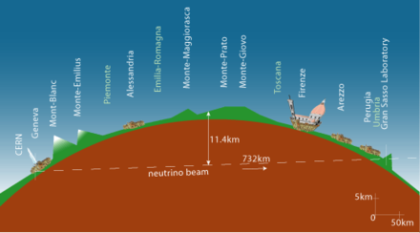
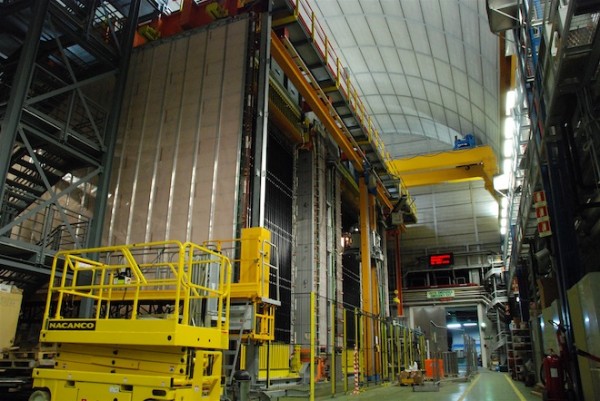
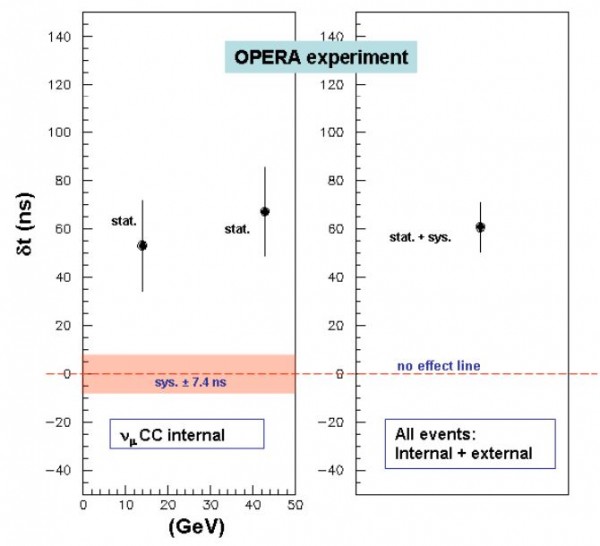

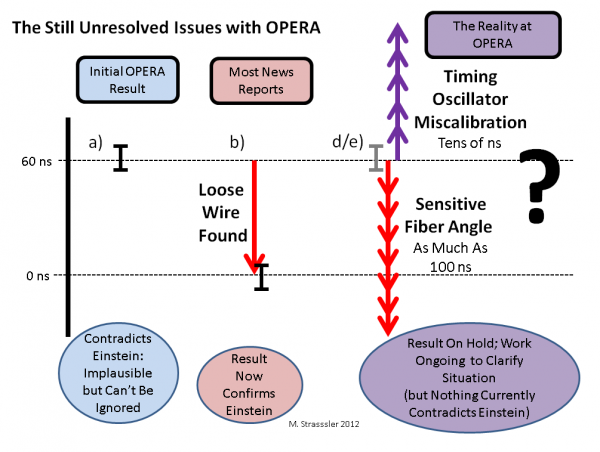
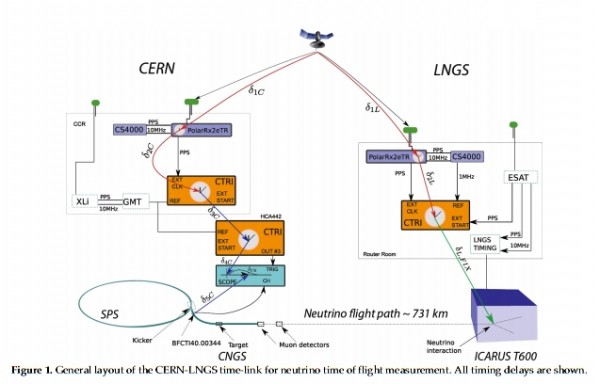

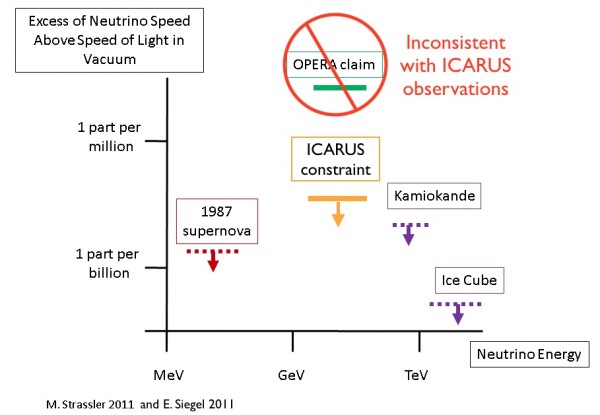
Not suprised like most, however it would have been terribly interesting if the OPERA results had been confirmed by ICARUS.
What I find interesting about this whole neutrino thing is that some scientists who worked on the project refused to sign the published paper because the results were not in line with what they expected it to be. Publishing a paper with measurements of an experiment should be neutral, and unrelated to one's own beliefs.
I wonder if the same "Scientific Journalists" that wrote some of the more sensationalists articles about the OPERA results when the first data was released from their experiments, will be as earnest in their follow up articles refuting the same results?
I doubt it. Because refutation doesn't bring the mouse clicks and page views.
Looks like game over for FTL.
But can someone explain some statistics to me. Initially opera had thousands of events, of which some small amount exhibited FTL properties, but overall statistically significant.
Now, ICARUS has only 7 events, some below C, some above. But on average and given the systematic, they average +-0.3ns C.
What I don't understand is how can 7 compare to, think is was something around 12.000 events of opera?
@Sinisa
This is because they changed the neutrino beam. After the OPERA results were anounced, the protons in the beam that creates the neutrinos were more strongly focused and the time between two bunches was set to more than 500ns. This made it much easier to associate neutrino events with neutrino creation - the first opera experiment had to rely on statistics for that.
@5 MartinB
Thank you for that explanation.
Not at all so, Chelle. Publishing a paper with measurements of an experiment is stating that you accept the tools and methods used to make that measurement as valid, as well as accept the stated confidence level based on those tools and methods.
If you don't accept those, then publishing would not be appropriate.
Ema Nymton@7 - I think that there's a big difference between an a priori objection to the fundamentals of an experiment and an a posteriori objection to the result itself.
I agree that if a scientist has a problem with things like the experimental setup, methodology, data analysis, wording or strength of the conclusion, or even if they thought the search for possible errors wasn't rigorous enough, they are justified (obligated, even) to withhold publishing or to remove their name. And despite my use of a priori above, it's also entirely appropriate to come up with such an objection after results are in hand (e.g. if an anomalous result caused you to re-examine the calibration of an instrument). But you can't beg the question - a miscalibrated instrument is miscalibrated in its own right. You can't say "the results aren't what I expected, therefore there *must* be a miscalibration, even if I can't find it".
I don't know the exact objections the project scientists, so they might have been justified in withholding their names. But given the history of science, we should get nervous whenever someone says "I can't find any fault with the equipment, methodology or analysis, nor propose a concrete thing that might be wrong, and the paper's conclusions aren't overstepping the experiment's results - but as I disagree with the implications, the experiment must be wrong somehow!"
We don't necessarily have to accept the experiment/conclusion/implications, but that shouldn't preclude an honest "here's what we did and here's what we saw - we tried our hardest and can't come up with any errors, but that doesn't mean there aren't any"-type paper. We may need extraordinary evidence to back extraordinary claims, but a heap is made of grains even when a grain is not a heap itself. If we had ignored every thing that doesn't back the Ptolemaic model, the Ptolemaic model would match 100% of the available evidence. Of course, in doing this, we have to recognize that there are grains which may not be part of a heap. Science is a process, not a result. If you want carved in stone and springing forth fully formed from peoples' heads, look to religion.
These FTL deniers are all funded by Big Oil!
Wait, this isn't Phil's blog, is it? Sorry, my bad! :-)
@Ema Nymton, you say "accept the stated confidence level" that is a subjective thing and in this case depending very much on the results, and a crucial theory that it may or may not question. btw how does one measure such a confidence level?
Science should be 100% objective, you write a structured paper:
- Abstract
- Introduction
- Methods
- Results
... and in an additional 'Discussion' section you can state that you have doubts because of this or that, but not wanting to share (publish) because you haven't got enough 'confidence' is the most silly thing to do.
Ethan is a complete tool, in every post with a topic on the OPERA experiment he always say that OPERA claim this and that and that they are incompetente and accuse them of all sorts of stuff, stop that, that attitude will hurt the industry.
The reason why OPERA published their result was to say "hey, this is a weird result, we cant confirm this, can the worlds scientist please help us get this straight", that IS a healthy attitude, they never claimed anything, they never claimed that their result was 100% absolute truth, quite the opposite.....
Ethans childish behaviour toward the OPERA experiment really hurt the industry, more and more scientist will work in complete darkness, stop publishing results because people like Ethan have no interest in helping coming to the right conclusion, Ethan only criticize and criticize the OPERA team and accusing them to no end, it does NOT help the agenda at all, as i said, it will have the opposite effect.
Lets say a science team contains 10 people, they make an experiment with extraordinary results but since the world consist of childish people like Ethan they will never ever ask for help, they will only use the brainpower of 10 people, making it take extremely long time to come to a definite conclusion, if they instead publish the current result and like OPERA never CLAIM that this is the absolute 100% right but ask the world to help, using the brainpower of thousands of people, the definite conclusion will arrive MUCH faster.
People like Ethan makes the progression of scientific discoveries alot slower, people like him, saying that OPERA claimed this and that (when they didnt) and Ethans attitude now is "haha OPERA was wrong" etc.
So now when OPERA published their result really early the world could come to the right conclusion in less than a year, but now, because people like Ethan have this arrogant attitude, scientist will not publish their result and it may take 3-4 years of experiments by this team to come to the right results. But now when OPERA published their result the conclusion arrived much much fasten than if they kept it a secret instead....
So Ethan stop with your arrogant childish attitude if you dont want the right conclusion to take 3-4 times longer than it has to......people like you are really hurting the progress of scientific discoveries......and stop saying that a team of scientist claimed something they actually didnt claim. the very first thing OPERA said in their first press release was that this is NOT a claim, they just wanted to get the results out their so alot more people could help get to the right conclusion alot faster.......
"As we've said many times, claims like these, that are extraordinary, require evidence that is also extraordinary."
Mind you, you have to qualify that with "but not tha evidence", since the evidence they had WAS extraordinary.
It's a pithy catchphrase, but wrong, innit.
Better is that extraordinary claims require overwhelming evidence.
The evidence they have shows SOMETHING.
We now have good evidence that what it shows is not superluminal neutrinos.
So the next step is: what IS it showing?
PS I'm behind JesperA 100%. Stop crowing, Ethan. 'sfunny that when it was confirmed by a better measure you were all "Weeeel, they might have something" but that consideration was bookended with a crowing of "THE FOOLS! THE MAD MAD FOOLISH FOOLS!!!!".
"accept the stated confidence level" that is a subjective thing and in this case depending very much on the results, and a crucial theory that it may or may not question. btw how does one measure such a confidence level?
As your question implies, confidence levels can be measured, and they are not subjective. This is why it is appropriate for somebody who thinks the confidence levels are not correctly stated to withdraw from the paper. It is not always easy to determine your sources of error, particularly where there are unexpected systematic effects as here, but once you determine them, they can be measured. There are statistical uncertainties, and there are effects due to the limitations of your measurement apparatus. If these sources of error are uncorrelated (frequently but not always true), the square of the overall uncertainty is the sum of the squares of the uncertainties of each piece. Confidence level is derived by assuming errors are normally distributed, so that, for instance, two standard deviations would be a 95% confidence level.
I know of a case (unrelated to this one) where somebody did have his name taken off of a paper. He found out that certain features which the lead author was interpreting as evidence of a certain phenomenon were similar to features which appeared in laboratory calibration data.
@ JesperA
"The reason why OPERA published their result was to say "hey, this is a weird result, we cant confirm this, can the worlds scientist please help us get this straight", that IS a healthy attitude, they never claimed anything, they never claimed that their result was 100% absolute truth, quite the opposite....."
Which is how Ethan characterised the situation from the beginning -- excepting that they DID make claims, specifically that they got a certain result, and that their error bars were small enough that it would be a significant result -- so basically your whole rant is B.S.
At multiple levels, since even it was true that Ethan was being "unhelpful" it's still nonsense to suppose scientists will stop seeking help corroborating their results particularly in cases where those results are far outside the expected.
@Eric Lund, I have read your comment 5 times and it still makes no sense. You can talk about all the statistical uncertainties, or error margins of the calibration IN your paper, that is what a paper is for, and in the conclusion you can discuss your confidence levels as much as you like. A paper is about sharing information, results and thoughts regarding an experiment that you have done. Not wanting to publish your thoughts and ideas, is like not daring to pose a question because you think that it makes you look stupid, well there are no ...
If the paper is terrible, if the science is bad, if the conclusions not sound or the details of the experiment incomplete, then removing your name from this paper is a way of protesting these facts. In several of those cases the paper isn't a good paper and little real information is gained from publishing it. And more to the point, your association with flagrantly bad science -- not bad results, but bad science -- would rightfully be embarrassing and possibly career-damaging. So if you aren't responsible for those mistakes, why would you want to have your name on the paper?
I have no idea why those people took their name off the OPERA paper, I'm just explaining that it isn't about not wanting to share information.
And there most certainly are stupid questions.
"Mr. Armstrong, why do you continue to lie to the public about having landed on the moon?" is a stupid question. If we were collaborating on a list of questions to send to Mr. Armstrong, and you insisted on including that one, then I would ask you to remove my name from said correspondence!
To sign or not to sign... If I weren't comfortable with the conclusions made in a paper to which I contributed I don't think I'd sign it. Coming from an engineering background into science, and working with people mostly coming from the opposite, I've seen any number of cases of people understanding the science but misapplying or not understanding all the nuances of using their tools (how to read the specs behind the specs is an art). This paper is pretty much an exercise in using tools.
As outsiders I don't think we have any good idea as to the background here. Reading the paper was extremely useful for me personally though as we run into these sort of timing issues.
Was publishing it a good idea? Assuming this was an execution mistake, then I think its a well that will quickly run dry. No doubt this was a top level effort and learning from the mistakes (assuming that those are in fact the case) is useful in this case, but that only goes but so far.
Given the title of this post I thought it was going to be results of a re-test with the loose cable fixed. Bummer...
Scratch that comment -- I just read more carefully, it turns out this was a re-measure of the speed! Cool! I guess that closes this mystery up for good now. :) Cheers!
Yeah, was just a little too trigger-happy with the comments there, I just saw "ICARUS" and thought it was another _energy_ measurement...
"Which is how Ethan characterised the situation from the beginning"
Nope. Ethan characterised this situation from the beginning as "What about SN1987a, huh, MORONS!!!".
I was here at the time. Many of us were. Please stop rewriting history because Ethan is a good scientist, because he's still a human being under all that science-stuff. And humans can be arseholes.
Derpa-derp, I was here too and that is wrong. Just because you're for some reason unhappy that Ethan was strongly of the opinion that these results would not hold up, and trotted out the other observations that informed that opinion, and turned out to be right, doesn't mean you can put words in his mouth so he sounds like an asshole, asshole.
And I was talking about how Ethan characterized OPERA's claims -- not "FTL! Take that Einstein!" but "Hey we got a result, and we need help figuring out what is up" i.e. correctly -- that was the point of discussion so that "nope" was also missing the point.
P.S. "Extraordinary claims require extraordinary evidence" is correct, you just have to understand that "extraordinary" is different for claims (outrageous!) and evidence (beyond definitive!).
Um, what is "beyond definitive" evidence?
"Overwhelming evidence" is far easier to parse correctly.
"I was here too and that is wrong."
Really.
Lets see what Ethan was saying, hmm?
"No, we did not detect the neutrinos four years before we should have; the OPERA results are woefully inconsistent with the other observations. Reading the OPERA paper, and looking at their figures, I would in no way draw the conclusion that their 60 ns result is robust. I fully expect that this will fail to be reproduced.
Posted by: Ethan Siegel | September 23, 2011 2:09 AM"
Demonstrating the fallacy "Huh, what about SN1987a!!!". Or the title on the page:
http://scienceblogs.com/startswithabang/2011/10/a_test_for_neutrinos_pu…
and (which is my particular bugbear here) the apparently gleeful "The Fat Lady Sings for OPERA" here.
I mean, really, if you get your shitsngiggles from this sort of thing, Ethan, you ought to give up your current job and become a "commentator" at Fox.
"Extraordinary evidence" is perfectly easy to parse and understand and sounds better, too.
So I guess "I fully expect this won't be reproduced" is the same as "FOOLS! MORONS!" ? That's exactly what I remember and your interpretation says more about you than it does Ethan. You'd think someone spouting hyperbole and claiming it's historical fact (no, the text is fact and your hyperbole does not appear there) would be more forgiving of a pithy turn of phrase. But I guess to you your bugbear is fact, while to me it looks mythological.
You've already taken the role of Fox News-style "commentator". have fun with that.
""Extraordinary evidence" is perfectly easy to parse and understand and sounds better, too."
Nope.
When you're shown something extraordinary, it is evidence that is extraordinary.
Footage of someone being run over by an 18-wheeler articulated lorry is extraordinary evidence.
But it isn't going to convince anyone that this is anything other than a trick.
HOWEVER, if the evidence were to show this happening in blind studies across the country, with people kicking the tyres, crowdsourced camera phones showing all sides of the "trick", then the evidence of this really happening isn't "extraordinary", it's "overwhelming".
Extraordinary: that which is out of the ordinary.
Ovewhelming: overpowering in effect or strength.
Evidence showing a 60ns preceede of neutrinos is extraordinary.
But it would take several independent studies to make evidence for such an effect OVERWHELMING.
Prediction of Forthcoming Superluminal Neutrino Results
Provided that the distances used are not changed, please find hereafter my theory’s prediction for all forthcoming superluminal neutrino experiments which could be conducted at CERN or Fermilab,.
For any lead time (δt) and distance D, the value of (v-c)/c could be calculated from the equation:
(v-c)/c=〖((2 )/( 1- (c δt)/D)-1)〗^(1/2) - 1 (see Eq. S13 in the supporting information of the manuscript http://suleiman.haifa.ac.il/images/Images/Suleiman__A_Theory_of_the_uni…)
For convenience, the table below includes ex ante predictions for selected δt values. I hope that predicting forthcoming results before they are announced might convince you that my theory is worthy of your serious consideration . Sincerely, Ramzi Suleiman.
Prediction of v-c/c for several neutrino lead time (δt)
δt (ns.)OPERA
(D=730.085 km.)ICARUS
(D = 730.085-.0557 km.)MINOS
(D = 734 km.)
-10-4.11 X 10^-6- 4.45 x 10^-6- 4.08x10^-6
-5-2.05 X 10^-6- 2.22x 10-6- 2.04x10^-6
0000
0.3*-1.33 x 10^-7
(exp. 1.33 x 10-7)-
52.05 X10^-62.22 x 10^ -62.04x10^-6
104.11X 10^-64.45 x 10^-64.08x10^-6
156.16 X 10^-66.67 x 10^-66.13x10^-6
208.21 X 10^-68.89 x 10^-68.17x10^-6
251.03 X 10^-51.11 x 10^-61.021x10^-5
301.23 X 10^-51.33 x 10^-51.23 x 10^-5
351.44 X 10^-51.56 x 10^-51.430x10^-5
401.64 X 10^-51.78 x 10^-51.633x10^-5
451.85 X 10^-52.00 x 10^-51.838x10^-5
502.05 X 10^-52.45 x 10^-52.042x10^-5
552.26 X 10^-52.10 x 10^-52.246x10^-5
602.46 X 10^-52.67 x10^-52.450x10^-5
652.67 X 10^-52.48 x 10^-52.655x10^-5
126**--5.14 x 10^-5
(exp. = 5.1±2.9)x10^-5
(*) Previous experiment. The reported result was δt= (0.3 ± 4.0stat ± 9.0 sys) ns; (v-c)/c = 1.33 x 10-7 (see: Antonello, M. et al. (2012). Measurement of the neutrino velocity with the ICARUS detector at the CNGS beam. [arXiv:1203.3433]).
(**)Previous experiment. The reported result was δt = 126 ± 32 (stat.) ± 64 (sys.) ns.; (v-c)/c = (5.1±2.9) )(stat) ×10-5 ns.(see Adamson, P. et al. (2007). Measurement of neutrino velocity with the MINOS detectors and NuMI neutrino beam. [MINOS Collaboration], Physical Review D, 76 (7), 2005-2012 [arXiv:0706.0437]. Previous results by OPERA are not included since OPERA have announced that their results were incorrect due to hardware problems.
Ramzi Suleiman is obtaining very accurate, if not exact results, based on an exact equation but, unfortunately, his "theory" is wrong. It is based on wrong assumptions and contains many mathematical mistakes. However, the final formulas he obtained are exact. This may sound very strange, but the future will uncover the truth. It is all based on Fractal Logic which physicists have to admit sooner or later.